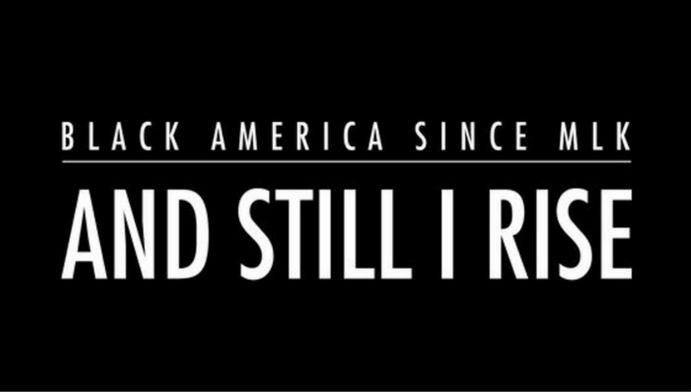
Section Branding
Header Content
New PBS Documentary Examines African-American Life Since MLK
Primary Content

Black America Since MLK: And Still I Rise, a two-part, four-hour documentary series hosted, executive produced and written by Harvard professor Henry Louis Gates, Jr., will premiere on GPB over two Tuesdays—November 15 and 22, 2016, at 8:00 p.m.
In Black America Since MLK, Henry Louis Gates, Jr. looks at the last 50 years of African-American history—from Dr. King to Barack Obama, from James Brown’s “I’m Black and I’m Proud” to Beyoncé’s “Formation”—charting the remarkable progress black people have made, and raising hard questions about the obstacles that remain. The series begins at the point where the story we Americans tell about ourselves becomes complicated. Almost every schoolchild today learns about the civil rights movement—about how our nation moved itself forward, against the will of many, out of a shameful past. Yet what has happened since? It is here where the series steps out of the sanctified past and into the complex, raw, conflicted present. Today, Barack Obama sits in the White House and African Americans wield influence in every domain, from business to academia to the arts. At the same time, black people are incarcerated at six times the rate of whites and face financial inequality, while whites now have 13 times the wealth of blacks. Many of our schools and neighborhoods are more segregated than they were in 1965, and police killings of unarmed black men in places like Ferguson, Baltimore and Baton Rouge recur with tragic frequency—inspiring radically different responses within black and white communities. How did we end up here, when half a century ago racial equality seemed imminent—even inevitable?
To find out, Gates offers a fresh examination of key events and turning points in American race relations and black history over the last five decades—animated by viewpoints that have rarely been heard on television, ideas that are not often said out loud and questions that many are afraid to ask. In essence, Black America Since MLK chronicles the extraordinary changes that have marked our nation through the eyes of members of the black community who represent its great diversity—a diversity manifested, on one hand, in the rise of a thriving black upper middle class, unparalleled black cultural influence and our nation’s first black president, alongside the emergence of disproportionate poverty, mass incarceration and the rise of the Black Lives Matter movement.
By examining the changes to black America wrought by cultural and political forces, new questions of identity, new modes of communication, a globalizing economy and mass incarceration, Gates asks what the black community has accomplished since 1965—and what it means to be “black” today? These profound questions evoke both the immense progress that has been made and the great challenges that lie ahead.
For more information about Black America Since MLK: And Still I Rise, visit www.pbs.org/show/black-america-mlk-and-still-i-rise/.
Classroom Resources
GPB is proud to provide free resources to Georgia educators and students through our partnerships with PBS LearningMedia and Discovery Education.
Taking a Stand
Grades: 3-5
This lesson provides an introduction to the discrimination and segregation that triggered the Civil Rights movement, through the eyes of some of the youngest activists at the time.
Strategies for an Equal Education
Grades: 6-12
Examine some of the obstacles to equal education that African Americans faced in the 20th century, the segregation that triggered the Civil Rights movement, and the different strategies people used to effect change in this PBS lesson.
Civil Rights: An Investigation
Grades: 9-12
Students uncover the true meaning of civil rights and civil liberty and the efforts to apply them to all people in this Discovery Education lesson.
Do you have a favorite civil rights lesson? Share it in the comments section below!
Black America Since MLK: And Still I Rise, a two-part, four-hour documentary series hosted, executive produced and written by Harvard professor Henry Louis Gates, Jr., will premiere on GPB over two Tuesdays—November 15 and 22, 2016, at 8:00 p.m.
In Black America Since MLK, Henry Louis Gates, Jr. looks at the last 50 years of African-American history—from Dr. King to Barack Obama, from James Brown’s “I’m Black and I’m Proud” to Beyoncé’s “Formation”—charting the remarkable progress black people have made, and raising hard questions about the obstacles that remain. The series begins at the point where the story we Americans tell about ourselves becomes complicated. Almost every schoolchild today learns about the civil rights movement—about how our nation moved itself forward, against the will of many, out of a shameful past. Yet what has happened since? It is here where the series steps out of the sanctified past and into the complex, raw, conflicted present. Today, Barack Obama sits in the White House and African Americans wield influence in every domain, from business to academia to the arts. At the same time, black people are incarcerated at six times the rate of whites and face financial inequality, while whites now have 13 times the wealth of blacks. Many of our schools and neighborhoods are more segregated than they were in 1965, and police killings of unarmed black men in places like Ferguson, Baltimore and Baton Rouge recur with tragic frequency—inspiring radically different responses within black and white communities. How did we end up here, when half a century ago racial equality seemed imminent—even inevitable?
To find out, Gates offers a fresh examination of key events and turning points in American race relations and black history over the last five decades—animated by viewpoints that have rarely been heard on television, ideas that are not often said out loud and questions that many are afraid to ask. In essence, Black America Since MLK chronicles the extraordinary changes that have marked our nation through the eyes of members of the black community who represent its great diversity—a diversity manifested, on one hand, in the rise of a thriving black upper middle class, unparalleled black cultural influence and our nation’s first black president, alongside the emergence of disproportionate poverty, mass incarceration and the rise of the Black Lives Matter movement.
By examining the changes to black America wrought by cultural and political forces, new questions of identity, new modes of communication, a globalizing economy and mass incarceration, Gates asks what the black community has accomplished since 1965—and what it means to be “black” today? These profound questions evoke both the immense progress that has been made and the great challenges that lie ahead.
For more information about Black America Since MLK: And Still I Rise, visit www.pbs.org/show/black-america-mlk-and-still-i-rise/.
Classroom Resources
GPB is proud to provide free resources to Georgia educators and students through our partnerships with PBS LearningMedia and Discovery Education.
Taking a Stand
Grades: 3-5
This lesson provides an introduction to the discrimination and segregation that triggered the Civil Rights movement, through the eyes of some of the youngest activists at the time.
Strategies for an Equal Education
Grades: 6-12
Examine some of the obstacles to equal education that African Americans faced in the 20th century, the segregation that triggered the Civil Rights movement, and the different strategies people used to effect change in this PBS lesson.
Civil Rights: An Investigation
Grades: 9-12
Students uncover the true meaning of civil rights and civil liberty and the efforts to apply them to all people in this Discovery Education lesson.
Do you have a favorite civil rights lesson? Share it in the comments section below!
Black America Since MLK: And Still I Rise, a two-part, four-hour documentary series hosted, executive produced and written by Harvard professor Henry Louis Gates, Jr., will premiere on GPB.





